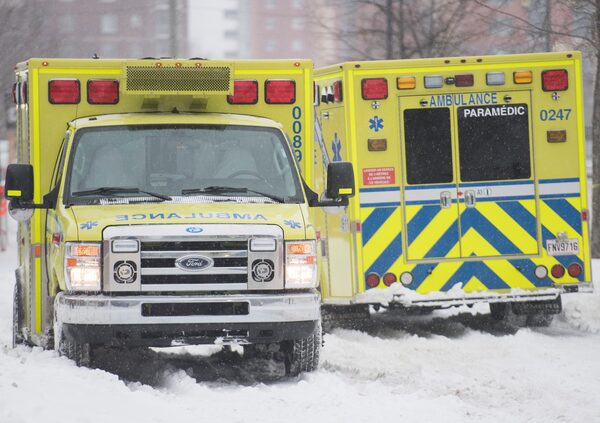
Ambulances are parked outside a hospital in Montreal, on Jan. 2, 2021.Graham Hughes/The Canadian Press
Quebec Premier Francois Legault says he is considering imposing more restrictions during spring break week to prevent people from gathering and reversing progress on reducing COVID-19 infections.
New measures would only apply for the week of March 1 – Quebec’s spring break – and could include roadblocks and changes to the nighttime curfew in certain regions, he told reporters. Most of the province is under an 8 p.m. to 5 a.m. curfew but the health order was pushed to 9:30 p.m. in six, less-populated regions.
“We cannot gather with other families and people over 65 cannot babysit children,” Legault said, regarding the break period, adding that any changes would be announced in the coming days.
His comments came as health officials said they had identified the South African variant of the novel coronavirus for the first time in the province – two cases located in Abitibi-Temiscamingue. They said they had identified a total of 11 cases of new variants, including eight cases of the U.K. variant and one that is under investigation.
Public health director Dr. Horacio Arruda said the province is able to sequence eight per cent of positive tests to detect new variants and plans to increase that to 15 per cent. Quebec is also screening for mutations of the virus, particularly those associated with the three known variants, Arruda added.
Speaking publicly for the first time since the province over the weekend surpassed 10,000 COVID-19-related deaths, Legault said he wanted “to offer my sympathies to the families of those we’ve lost.”
He also defended his handling of the pandemic, saying Quebec has improved during the second wave. After 11 months, he said, Quebec has not done as well as the rest of Canada and Germany, but it has done better than the United States, France, Spain, Italy and the United Kingdom.
“When we look at the G7 countries, we’re not the best, but we are among those that have come out the best,” he said.
Earlier in the day, Quebec’s opposition parties renewed their calls for a public inquiry into the government’s management of the pandemic.
Liberal Leader Dominique Anglade said Quebecers need to know why the province has so far accounted for nearly half of the country’s deaths attributed to the novel coronavirus.
Parti Quebecois Leader Paul St-Pierre Plamondon said an inquiry is the only way to shed light on the tragedy, noting that Quebec is reporting 116 deaths per 100,000 residents, compared to 45 in neighbouring Ontario.
Legault responded by stating that the province’s health and welfare commissioner, Joanne Castonguay, is already conducting a broad investigation into the province’s management of the pandemic. He said she will submit her report faster than a public inquiry would, and therefore his government, he said, can take action on her recommendations.
“We already have an independent commission,” Legault said, in response to the opposition. “She started her job already and we plan to receive a final report by next September.”
Anglade said it’s “inconceivable” that a public inquiry wouldn’t be called to investigate the largest public health crisis in the province’s history. She said Castonguay’s mandate – studying long-term care centres during the first wave – is too narrow and that she doesn’t have the tools to conduct an independent public investigation.
Meanwhile, health officials in St-Jean-sur-Richelieu, south of Montreal, said Tuesday all residents of Samuel-de-Champlain private seniors home will be tested after a health-care worker who vaccinated them last week tested positive for COVID-19 a few days later.
A spokeswoman for the regional health agency said the health worker’s symptoms only appeared two days after the vaccinations. About 60 residents of the seniors home are isolating as a preventive measure.
Infections continued their downward trend Tuesday, with officials reporting 826 new COVID-19 cases and 32 more deaths attributed to the virus, including five in the preceding 24 hours. Officials said hospitalizations dropped by 29, to 940, and 145 people were in intensive care, a drop of 15. The province said it administered 2,816 doses of COVID-19 vaccine Monday, for a total of 262,594.
The large number of COVID-19 infections in some places makes it more likely for new variants of the virus to emerge. Science Reporter Ivan Semeniuk explains how vaccines may not be as effective against these new strains, making it a race to control and track the spread of variants before they become a dangerous new outbreak.
The Globe and Mail
With files from Sidhartha Banerjee.
This story was produced with the financial assistance of the Facebook and Canadian Press News Fellowship.
Sign up for the Coronavirus Update newsletter to read the day’s essential coronavirus news, features and explainers written by Globe reporters and editors.